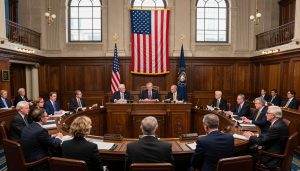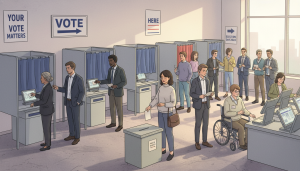Government Shutdown Week 3: What It Means for You
Explore the impacts of the Government shutdown week 3 on daily life, federal services, and what steps you can take during this uncertain time.

Government shutdown week 3
Government shutdown week 3: Week three is here, and there’s no deal yet. People feel it at work, at home, and on the road. The Senate passed a $925 billion defense bill, but the fight over funding continues.
Leaders are arguing, and the deadline for paychecks is looming. Uniformed military, Border Patrol, and air traffic controllers might miss their paychecks soon.
The Senate will take a break until Columbus Day. This means more uncertainty for everyone. Republicans want a short-term funding bill until November 21. Democrats want to extend health care subsidies to prevent high premiums.
Travel is being delayed, and services are becoming scarce. But Social Security checks are going out as usual. For more information on the shutdown’s effects, see this overview.
Families are worried about their budgets. If the shutdown lasts, they may not receive their pay. This could make things even tougher.
Behind the scenes, talks are happening, but not yet complete negotiations. Some lawmakers fear high health care costs if subsidies end. Others think the economy can handle the delay. NBC News explains what’s open and closed during a shutdown in this article.
Government shutdown week 3 Key Takeaways
- Week three begins with no funding deal and a continuing resolution standoff.
- The Senate recess through Columbus Day adds days of uncertainty for workers and contractors.
- ACA subsidies are the key demand for Democrats; Republicans push a CR to November 21.
- Missed paychecks could affect military personnel, Border Patrol agents, and air traffic controllers early next week.
- Travel delays, limited park access, and agency furloughs highlight the impacts of the government shutdown.
- Essential benefits continue, but pressure grows as Senate shutdown negotiations drag on.
Latest developments in the Senate and the continuing resolution standoff
Week three opens with a narrowed path on both policy and process. The fight over the continuing resolution has become increasingly complex. The shutdown timeline is becoming increasingly longer as leaders continue to argue over healthcare and defense. A late Senate vote moved one bill forward, but funding to reopen the government is stalled.
Senate recess through Columbus Day and return timeline
Senators are on recess until Columbus Day and will return on Tuesday. This delay pushes the shutdown timeline into another week. It also risks missed pay for workers tied to Monday’s payroll.
The Senate’s schedule limits chances for quick Senate floor votes on any deal.
GOP short-term CR push to Nov. 21 vs. Democrats’ ACA subsidies demand
Republican leaders want to keep pushing for a Nov. 21 CR to test Democrats’ unity. Democrats demand an extension of ACA tax credits, which were enhanced during the COVID-19 pandemic. A last attempt to vote on both the House and Democratic plans failed, as both were expected to lose.
Some Republicans think the credits need reform. Others warn that delaying could harm families in the marketplaces. The government shutdown highlights the clash between the timing of subsidies and the open enrollment period.
Defense bill advances while shutdown negotiations stall
The Senate passed a bipartisan defense bill, the 2026 NDAA, on a wide vote. This move sets Pentagon policy but doesn’t solve the continuing resolution issue. With the NDAA passed, budget negotiators face a challenging task in reopening agencies or protecting ACA tax credits in a short-term deal.
Behind-closed-doors talks without complete negotiations
Quiet talks are ongoing among a small group of lawmakers. But leaders have not started full-scale talks. As time runs out, the shutdown timeline narrows options. Senators are deciding when to hold more Senate floor votes.
Staff say any breakthrough must be quick to fit within the Nov. 21 CR window and health policy demands.
Government shutdown week 3: what it means for you
Week three brings tighter budgets and rising stress. The Senate is out for the holiday. Families face federal worker pay delays and cutbacks in pay, health care, and travel.
Communities near bases and ports feel the strain. Federal services disruptions ripple outward.

Military, Border Patrol, and air traffic controller pay delays
Payroll deadlines collide with the calendar. Many could miss military paychecks this cycle. The risk extends to Border Patrol and air traffic controllers, who may work without pay as backlogs build.
Missed deposits initially impact rent, child care, and fuel costs. Essential crews continue to show up, but unpaid shifts drain savings and erode morale.
Airports and border crossings remain open, yet thin staffing and overtime requests raise concerns about fatigue. For a snapshot of closures and missed checks, see this report on ongoing shutdown impacts.
Healthcare stakes: ACA tax credits, premium hike warnings, and COVID-era subsidy extensions
Open enrollment is approaching, with warnings growing about potential ACA premium increases if enhanced credits are not extended. Lawmakers debate Obamacare subsidies, with several urging extensions of the COVID-era support to blunt shocks on families.
Even modest hikes can price out young adults and part-time workers. Insurers set rates now, so policy clarity matters. Without action, state marketplaces could see higher sticker prices and tighter choices, making subsidy timing as critical as the dollar amount.
Household finances: paycheck-to-paycheck risk and missed-paycheck timelines
Many paycheck-to-paycheck Americans say one missed deposit means late fees or new debt. Two missed paydays compound the hit, forcing skipped bills and drained emergency funds. Credit card balances and interest costs climb just as the holiday season nears.
Families trim nonessential spending, cancel trips, and delay medical visits. Small businesses near bases and airports report fewer diners and slower weekday sales, adding pressure to cash flow.
Travel, federal services, and broader economic ripple effects
Airports feel the pinch as air traffic controllers juggle overtime and fatigue, a mix that can slow operations. Federal services disruptions also touch border wait times, Small Business Administration lending, and museum access in major cities.
Local economies react fast: fewer tourists, slower reimbursements, and tighter contractor timelines. As the shutdown enters its third week, each day without clarity magnifies the costs for workers, households, and regional hubs that depend on steady federal activity.
Political pressure points and what could break the deadlock
As the Senate deadlock persists, pressure is mounting. Both sides are sending out messages every day. They aim to build momentum and keep the door open for talks that could lead to a stopgap.
Democrats’ leverage on ACA subsidies and premium concerns
Democrats see the ACA as a critical issue for families. They warn of premium spikes if subsidies end. They say a minor fix can stabilize plans and ease insurers’ worries before open enrollment starts. Shutdown stress test reporting has highlighted these concerns, keeping Democrats united.
They argue that their request is reasonable. They say protecting tax credits now will prevent bigger increases later.
Republican strategy to keep bringing the CR to the floor
Republicans are determined to keep voting on the CR. They believe this strategy will ultimately lead to a deal. They see it as the simplest way to get workers paid quickly.
Their plan relies on patience and public weariness. Each failed vote is used to show that Democrats are moving the goalposts.
Filibuster talk: resistance to the “nuclear option” and voices urging consideration
Leaders are cautious about using the nuclear option. They fear it could harm both parties in the future. The 60-vote rule is currently the main barrier.
However, if missed paychecks become a more significant issue, the situation may change. Some suggest that this could lead to reconsidering the filibuster.
Public messaging battles and momentum narratives
Republicans focus on the political nature of the standoff, while Democrats highlight the impact on premiums and pay. Both sides use clips and charts to shape public opinion. They aim to sway undecided senators and influence the next vote.
Behind the scenes, bipartisan talks are ongoing. If one side’s message prevails, it could influence the next Senate move.
Government shutdown week 3 Conclusion
The government shutdown is heading into its third week. The Senate will return on Tuesday, which is the earliest chance for a solution. This means that service members, TSA officers, Border Patrol agents, and air traffic controllers might not receive their pay on time.
For those living paycheck to paycheck, this is a big worry. Travel and federal services are also affected. Everyone is feeling the pinch.
Republican leaders are pushing for a short-term fix until November 21. Democrats want to link this to a deal on ACA subsidies. This would help with high health insurance costs.
The Senate passed a 2026 defense bill, but it’s not enough to end the shutdown. Discussions are ongoing, but finding a solution is proving to be challenging. There’s no plan to change the filibuster rules.
If paychecks continue to be missed, both parties will face increased pressure. They might need to combine the ACA subsidies deal with a short-term funding fix. This would help with both immediate needs and long-term stability.
For more on the costs and effects of shutdowns, check out this government shutdowns overview. It highlights why delays are costly for workers and the economy.
The way forward is clear but narrow. They need to find a continuing resolution that also stabilizes health coverage. Meeting the Senate return deadline is key. This will help everyone get back to work and start talks for the future.
Government shutdown week 3 FAQ
How long has the government shutdown lasted, and what’s the current timeline?
The shutdown is now in its third week. The Senate is on break until Columbus Day. They will return on Tuesday, which means there will be no deal before then.







